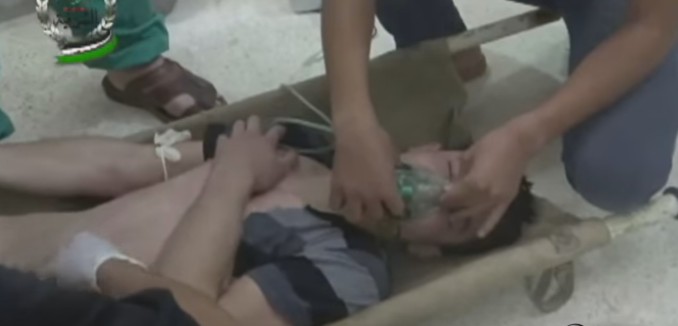The latest reported use of chemical weapons by the Iran-backed regime of Syrian dictator Bashar al-Assad represents a “milestone” in global tolerance of their deployment, a top expert on Middle Eastern biological and chemical warfare warned on Tuesday.
Assad’s forces used proscribed weapons — likely including Sarin nerve gas — to prevent ISIS from seizing two strategic military airports near Damascus on April 23, wrote Dany Shoham, a microbiologist and reserve lieutenant colonel in the Israeli military.
Shoham noted that rather than deploying chlorine gas, as the regime usually does, Assad used “far superior … military grade weapons to meet a critical strategic imperative, and his decision to do so was tolerated by the international community – an instructive result of which he no doubt took note.” Russia and Iran, Assad’s supporters, raised no objections to the use of these prohibited weapons by their client.
Russia, which was critical in forging the agreement to rid Syria of its chemical weapons arsenal, has demonstrated “no discomfort with this, even taking steps on occasion to obscure the incidents.” Iran, which Shoham wrote has a vast store of chemical weapons, may prefer to give some of its arsenal to Assad rather than risk losing even more troops in the Syrian civil war.
Assad’s continued use of chemical weapons reflects the “the weakened position of the United States in the Middle East,” as President Barack Obama failed to enforce the “red line” on chemical weapons use that he proclaimed in 2013, Shoham observed.
“International red lines that were shaky at best have evaporated completely, possibly because the intended target of the weapons is IS,” he continued. “The lack of any meaningful international will to interfere with the Syrian regime’s struggle against an unsavory common enemy simplifies the regime’s decision to unleash its chemical arsenal.”
If it is subject to regular chemical weapons attacks, ISIS may have an increased motivation to advance its WMD capabilities and utilize similar weapons against Assad’s forces or in terrorist attacks.
“The recent aggressive use of chemical weapons by the Syrian regime against IS is a milestone,” Shoham concluded. “It suggests a possible transition to the repeated, effective, and scarcely acknowledged use of chemical weapons by the regime – a development that could eventually propel an equivalent response by IS. Such a transition, if realized, could reshape the conflict by redefining both the legitimacy and the practicability of using such weapons.”
U.S. officials warned last year that the Assad regime is likely to use chemical weapons as a last resort to protect key installations.
The Assad regime killed hundreds of civilians in a chemical attack on a Damascus suburb in August 2013. Despite a deal drawn up in the wake of this attack to rid Syria of its chemical weapon stockpile, the Assad regime has continued to use chlorine gas, and traces of chemical weapons were found in May 2015 at facilities that Assad had not declared. Last year, Iran attempted to block diplomatic efforts to condemn Syria for its violation of the chemical weapons agreement it had signed.
Assad prevented inspectors from accessing all of his chemical weapon stores in July 2015, allowing Syria to avoid completely complying with the deal it had agreed to in 2013. American intelligence at the time indicated that Assad still retained “caches of even deadlier nerve agents.”
Ely Karmon, a senior research scholar at Israel’s International Institute for Counter-Terrorism, warned that the failure of Syrian chemical arms agreement to rid Syria of those illegal weapons boded poorly for the success of the nuclear deal with Iran. After Assad was reported to have kept inspectors away from his chemical weapons stockpile, Karmon asked, “If this is the record of the international community in dismantling and monitoring the chemical and nuclear facilities in Syria, how exactly it will do better in monitoring the vast Iranian nuclear infrastructure?”
[Photo: ABC News / YouTube ]




